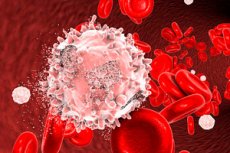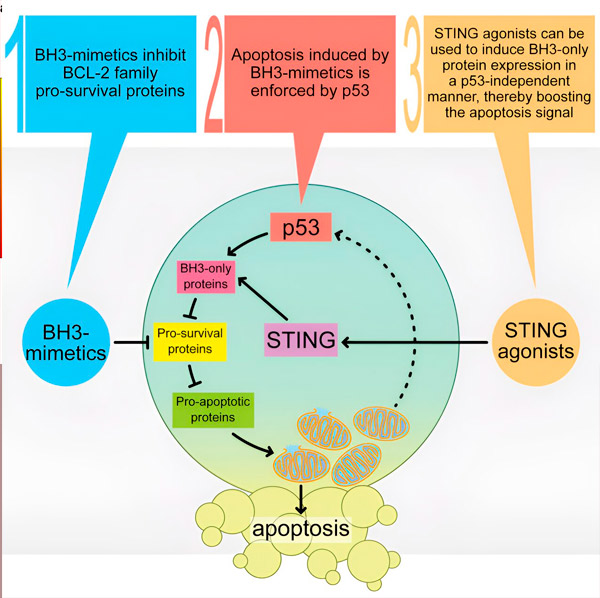Nye publikasjoner
Kombinasjonsbehandling mot blodkreft: Studie viser at to legemidler dreper kreftceller
Sist anmeldt: 02.07.2025

Alt iLive-innhold blir gjennomgått med medisin eller faktisk kontrollert for å sikre så mye faktuell nøyaktighet som mulig.
Vi har strenge retningslinjer for innkjøp og kun kobling til anerkjente medieområder, akademiske forskningsinstitusjoner og, når det er mulig, medisinsk peer-evaluerte studier. Merk at tallene i parenteser ([1], [2], etc.) er klikkbare koblinger til disse studiene.
Hvis du føler at noe av innholdet vårt er unøyaktig, utdatert eller ellers tvilsomt, velg det og trykk Ctrl + Enter.

En ny kombinasjon av to kreftmedisiner har vist seg lovende som en fremtidig behandling for pasienter med akutt myelogen leukemi (AML), en av de vanligste typene blodkreft. En ny studie av forskere ved WEHI (Walter and Eliza Hall Institute of Medical Research) fant at en kombinasjon av to eksisterende legemidler drepte AML-celler i laboratorietester.
Oppdagelsen, publisert i tidsskriftet Cancer Cell, kan snart føre til kliniske studier, noe som gir håp for de 1100 australierne som får diagnosen AML hvert år.
Stimulering av «celledødsutøveren» WEHI-teamet kombinerte venetoklaks, et av standardlegemidlene for behandling av akutt myelogen leukemi, med en STING-agonist, en ny klasse immunterapilegemidler. Venetoklaks var basert på en banebrytende forskningsfunn ved WEHI.
Dr. Sarah Diepstraten, en av studiens medforfattere, sa at teamet så på ulike typer blodkreft, inkludert kreftprøver fra AML-pasienter, og behandlet dem i laboratoriet med en kombinasjon av medisiner, noe som førte til imponerende resultater.
«Det er veldig spennende at det å kombinere venetoklaks med denne nye immunterapibehandlingen faktisk kan utrydde AML», sa dr. Diepstraten.
Den kritiske rollen til p53-proteinet
Kombinasjonsbehandlingen viste stort potensial i AML-prøver assosiert med et mutert protein kalt p53, en type AML som vanligvis er mer aggressiv og vanskelig å behandle. P53-proteinet spiller en kritisk rolle i kroppen vår, ved å forhindre dannelse av kreftceller, fungere som en beskytter og stoppe veksten av skadede eller unormale celler. Imidlertid øker p53-mutasjoner risikoen for å utvikle kreft betydelig.
«For pasienter med AML som ikke opplever tilstrekkelig død av leukemicellene sine på grunn av denne mutasjonen, forårsaker kombinasjonen av venetoklaks med en STING-agonist større dreping av AML-celler enn behandling med venetoklaks alene», forklarer dr. Diepstraten.

Grafisk figur. Kilde: Cancer Cell (2024). DOI: 10.1016/j.ccell.2024.04.004
STING-agonist i en ny rolle
Denne studien er den første som bruker en STING-agonist til å målrette mekanismer i kreftceller direkte, og stimulere de naturlige prosessene som får dem til å dø. Tidligere har STING-agonister blitt brukt til å angripe solide svulster ved å aktivere kroppens immunrespons.
Potensielle kliniske studier
Professor Andrew Wei, en av seniorforfatterne av studien, sa at resultatene var svært lovende, selv om det var behov for ytterligere forskning.
«Tidlige kliniske studier av solide svulster har vist at STING-agonister tolereres godt av kroppen, og disse resultatene gir nytt håp for pasienter med de mest resistente formene for leukemi», sa professor Wei.
WEHI og deres kliniske partnere omsetter nå disse lovende resultatene til en ny klinisk studie for AML-pasienter i samarbeid med Melbourne-baserte bioteknologiselskapet Aculeus Therapeutics, som utvikler sin egen STING-agonist.
Administrerende direktør i Aculeus Therapeutics, Dr. Mark Devlin, sa at han var begeistret for potensialet i WEHIs nylige oppdagelse. «Legemiddelutvikling er et lagspill innen vitenskap. Aculeus har utviklet et lovende nytt legemiddel, men samarbeid med WEHI-teamene, som har dyp forståelse av sykdomsbiologien og det kliniske landskapet, vil bidra til å bestemme hvordan dette legemidlet vil bli brukt mest effektivt.»
Aculeus' STING-agonist, ACU-0943, forventes å bli tatt i kliniske studier for behandling av AML senere i år.
